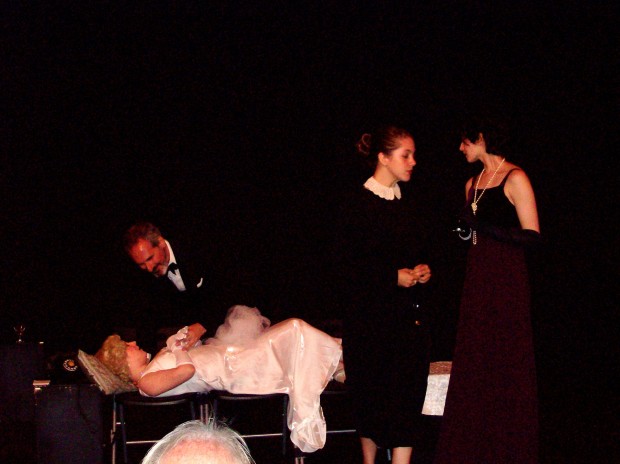 When people love each other, there should be no boundaries that prevent them from being together, even if their love is not accepted by the world they live in. Unfortunately, the laws of the society often overrule our desires.
When people love each other, there should be no boundaries that prevent them from being together, even if their love is not accepted by the world they live in. Unfortunately, the laws of the society often overrule our desires.
This is what “Lavender Shore,” a play written by Lawson Caldwell and presented at Midtown International Theatre Festival, explores.
Intrigued by the plot and fascinated by the skills of the actors and their body language that betrays their characters’ true feelings no matter how hard they try to conceal them, you will find the play entertaining and worthy of your time.
As far as the story line is concerned, there are a few unusual twists there. Harrison Anderson (Markus Potter) who had been missing for five years is finally found on a deserted island where he had been living with his butler for all these years after they suffered a shipwreck. In the mean time, his wife, Daphane Anderson (Katie Yamulla), decides to get married again as she feels that there is no hope that her husband will ever come back.
Ironically, the telegram from him notifying that he is found alive comes on the day of her second wedding, which leaves Daphane with two husbands at the same time.
As though this is not intriguing enough, there is another side to the story. Even though Harrison is happy to come back to his wife, he is now in love with another person, his butler, Gerald (Colin Pritchard), but their relationship is endangered because homosexual love is not welcomed by American society of 1936. To make the matters worse, they belong to different social classes as well and Daphane still thinks that Gerald is a servant. To Harrison he is not.
To say the least, the story is pretty unusual and the viewers are constantly interested to find out what happens next and to see how the characters will get out of this tense situation.
As for the characters themselves, they are well-defined in the play. You can clearly see what kind of people they are. It is sad that those who possess high social status have to manipulate their emotions in order to remain in their place. The audience understands that no matter what the characters say, they always have another thing in mind. For instance, Daphane’s second husband, Thomas (Patrick James Lynch), claims that she has to be with him because he loves her. In reality, however, he needs her to improve his standing in the society. In order to marry Daphane, he even dumped his fiance at the time, Gwendowlyn Langsford (Rachel Claire), which left her heartbroken and eager to take revenge.
Portraying such complicated characters, the actors are great. The best role is definitely the butler’s: he doesn’t say much, but he is always showing his true emotions and you can see how he moves aside when he feels that he’s out of place in the house of his secret lover. He also implies a lot in his short speeches, and it is amazing how much can one say with little words.
Along with the butler, every character in the play is portrayed the best way possible. Every one of them has emotions they do not mean to reveal but they can’t help it. They always try to stay polite, but if a person doesn’t belong to their cirlcle for social or personal reasons, he or she has to be out. Their motives are corrupt, and their “friendliness” is fake.
In addition to great role playing, the actors wear beautiful costumes as well. The clothing helps the audience to transfer the situation to the past, to the late 1930s, which is when all the action takes place. The lavender dress that Daphane puts on for the last dinner in the play when she has to decide which husband she will stick to also has a second meaning to it. This was the last dress Harrison saw her in before he went missing, so she wonders whether or not he will remember.
With such a twisted story, “Lavender Shore” is pretty dynamic. The audience learns about the relationships between the characters fast, through their dialogues and looks. The conflict begins right from the start of the performance and it is resolved in the very end, which keeps the viewers engaged all the time. Also, the humor plays its role as well. There is a lot of irony in the sentences that the characters drop here and there, and they make the play more colorful and appealing to the audience.
And just as the curtain goes down, you may be pondering about how odd it is that time passes, but things stay the way they are anyway. 80 years ago, a man could not publicly love another man. Now we know how to deal with our prejudice and let other people be who they are.
And still, only this year did same sex marriage came to New York state and there are a lot of other places in the country and in the world where homosexuals cannot be legally united by law. Maybe we still do not fully accept them as a legitimate couple?

Leave a Reply